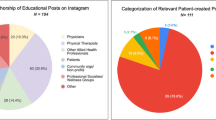Abstract
Introduction and hypothesis
There has been a great deal of discussion about mesh complications in urogynecology in recent years. However, awareness of other doctors who are not urogynecologists is unknown. This study was aimed at determining the level of awareness of mesh discussions among medical doctors whose specialty is not urology or gynecology.
Methods
A survey study was administered, and all medical doctors, except gynecologists and urologists, were invited. Respondent doctors were classified into four groups: King’s College Hospital (KCH), UK; Uludag University Hospital (UUH), Turkey; the United States (USA); and the world (WORLD). The primary outcome was the awareness of mesh discussion in urogynecology, and the secondary outcome was the social media awareness of the mesh discussion.
Results
1231 doctors responded to the survey. The awareness of the current mesh problems among the respondent doctors was 15.8% in KCH, 15.4% in UUH, 26.9% in the USA, and 16.2% in WORLD. The social media awareness about mesh problems was 20.8% in KCH, 20.3% in UUH, 32.8% in the USA, and 20.6% in WORLD. Although there were no differences among three of the groups with regard to primary and secondary outcomes, the USA group score was statistically significantly higher than the others.
Conclusions
Social media can influence doctors’ thinking on controversial academic issues. In this survey study, non-urogynecologist doctors in the USA cohort have higher awareness levels and a higher social media awareness level than other groups.







Similar content being viewed by others
References
Lensen EJ, Withagen MI, Kluivers KB, et al. Surgical treatment of pelvic organ prolapse: a historical review with emphasis on the anterior compartment. Int Urogynecol J. 2013;24(10):1593–602.
Maher C, Feiner B, Baessler K, et al. Surgical management of pelvic organ prolapse in women. Cochrane Database Syst Rev 2013;(4):CD004014.
Delorme E. Transobturator urethral suspension: mini-invasive procedure in the treatment of stress urinary incontinence in women. Prog Urol. 2001;11(6):1306–13.
Lukacz ES, Santiago-Lastra Y, Albo ME, Brubaker L. Urinary incontinence in women: a review. JAMA. 2017;318(16):1592–604.
Jonsson Funk M, Edenfield AL, Pate V, Visco AG, Weidner AC, Wu JM. Trends in use of surgical mesh for pelvic organ prolapse. Am J Obstet Gynecol. 2013;208(1):79.e1–7.
Vergeldt TF, Weemhoff M, IntHout J, Kluivers KB. Risk factors for pelvic organ prolapse and its recurrence: a systematic review. Int Urogynecol J. 2015;26(11):1559–73.
Zacche MM, Mukhopadhyay S, Giarenis I. Trends in prolapse surgery in England. Int Urogynecol J. 2018;29(11):1689–95.
Carter P, Fou L, Whiter F, Delgado Nunes V, Hasler E, Austin C, et al. Management of mesh complications following surgery for stress urinary incontinence or pelvic organ prolapse: a systematic review. BJOG. 2020;127(1):28–35https://doi.org/10.1111/1471-0528.15958.
https://www.fda.gov/MedicalDevices/ProductsandMedicalProcedures/ImplantsandProsthetics/UroGynSurgicalMesh/default.htm. Accessed 15 Jan 2019.
FDA decision on urogynecologic surgical mesh implants. 16.04.2019. https://www.fda.gov/MedicalDevices/ProductsandMedicalProcedures/ImplantsandProsthetics/UroGynSurgicalMesh/default.htm. Accessed 23 Apr 2019.
https://i.emlfiles4.com/cmpdoc/9/7/2/8/1/1/files/47633_mesh-letter-to-acute-ceos-and-mds.pdf. Accessed on 15 Jan 2019.
Morling JR, McAllister DA, Agur W, Fischbacher CM, Glazener CM, Guerrero K, et al. Adverse events after first, single, mesh and non-mesh surgical procedures for stress urinary incontinence and pelvic organ prolapse in Scotland, 1997–2016: a population-based cohort study. Lancet. 2017;389(10069):629–40.
https://www.thesun.co.uk/news/6468732/vaginal-mesh-uk-operation-implants-susan-morgan/. Accessed 2 Apr 2019.
https://www.youtube.com/results?search_query=mesh+survivors. Accessed 1 Apr 2019.
https://metro.co.uk/2018/09/06/woman-died-after-having-controversial-vaginal-mesh-fitted-7920553/ https://metro.co.uk/2017/12/05/vaginal-mesh-campaigner-dies-from-sepsis-triggered-by-her-implant-7132687/ https://metro.co.uk/2018/07/10/vaginal-mesh-barbaric-wont-rest-banned-good-7699049/ https://metro.co.uk/2017/11/27/vaginal-mesh-implants-should-be-banned-health-watchdog-says-7112441/ Accessed 2 Apr 2019.
https://www.instagram.com/explore/tags/slingthemesh/?hl=tr. Accessed 29 Sept 2019.
https://www.youtube.com/results?search_query=transvaginal+mesh+lawsuit Accessed 7 March 2019.
Ong HL, Sokolova I, Bekarma H, Curtis C, Macdonald A, Agur W. Development, validation and initial evaluation of patient-decision aid (SUI-PDA©) for women considering stress urinary incontinence surgery. Int Urogynecol J. 2019;30(12):2013–22. https://doi.org/10.1007/s00192-019-04047-z.
https://www.youtube.com/watch?v=ebmjbcoUHNY&t=48s https://www.youtube.com/watch?v=iZvizjlWBAI&t=195s Accessed 2 Apr 2019).
Heneghan CJ, Goldacre B, Onakpoya I, et al. Trials of transvaginal mesh devices for pelvic organ prolapse: a systematic database review of the US FDA approval process. BMJ Open. 2017;7(12):e017125.
Baylón K, Rodríguez-Camarillo P, Elías-Zúñiga A, Díaz-Elizondo JA, Gilkerson R, Lozano K. Past, present and future of surgical meshes: a review. Membranes (Basel). 2017;7(3) https://doi.org/10.3390/membranes7030047.
Mangir N, Aldemir Dikici B, Chapple CR, MacNeil S. Landmarks in vaginal mesh development: polypropylene mesh for treatment of SUI and POP. Nat Rev Urol. 2019;16(11):675–89.
Gurol-Urganci I, Geary RS, Mamza JB, Duckett J, El-Hamamsy D, Dolan L, et al. Long-term rate of mesh sling removal following midurethral mesh sling insertion among women with stress urinary incontinence. JAMA. 2018;320(16):1659–69.
Acknowledgements
The authors would like to thank their residents and secretaries in both hospitals for their help in collecting the data.
Funding
This project is an investigator-driven non-commercial trial. All costs linked to the design and the daily conduct of the trial were paid by the investigators without any financial support from a pharmaceutical company or any other third party.
Author information
Authors and Affiliations
Contributions
A.O.: project idea and development, data collection and management, questionnaire development, data analysis, manuscript writing/editing;A.R.: project development, data collection and management, data analysis, manuscript writing/editing, web-based survey management, questionnaire development;K.O.: protocol/project development, data collection and management, data analysis and calculations, manuscript writing/editing;I.K.: manuscript writing/editing, data collection;G. O.: data analysis, web-based survey management;K.A.: data collection and management, manuscript writing/editing;S.M.: data collection, web-based survey management;G.U.: project development, manuscript editing, mentor;L.C.: project idea and development, questionnaire development, manuscript writing/editing/proofreading, mentor.
Corresponding author
Ethics declarations
Financial disclaimer/conflicts of interest
The authors declare that they have no conflicts of personal, political, intellectual or religious interests.
Ethics approval
Approval from the Medical Research Ethics Board of Bursa Uludag University Hospital, Turkey: UU-SUAM-MREC-2018-13/11. All participants provided written informed consent.
Additional information
Publisher’s note
Springer Nature remains neutral with regard to jurisdictional claims in published maps and institutional affiliations.
Rights and permissions
About this article
Cite this article
Orhan, A., Rantell, A., Ozerkan, K. et al. Social media awareness among non-urogynecologists regarding the current mesh discussions in urogynecology: a survey study. Int Urogynecol J 31, 1231–1243 (2020). https://doi.org/10.1007/s00192-020-04242-3
Received:
Accepted:
Published:
Issue Date:
DOI: https://doi.org/10.1007/s00192-020-04242-3




